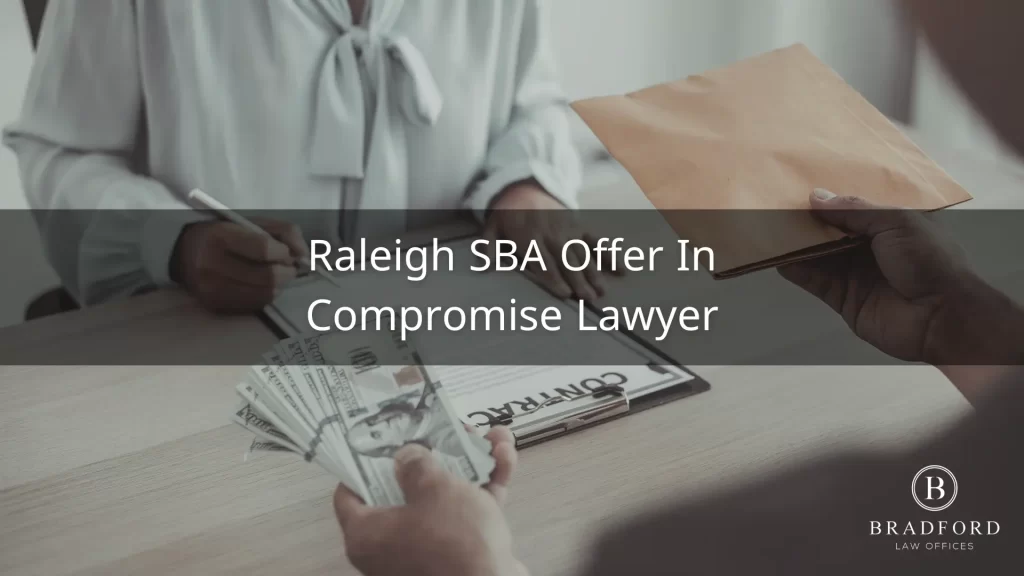
A loan from the Small Business Administration is beneficial to many business owners. Funding can help someone deal with financial hardships or start or grow a company. However, a loan isn’t free money. Some people fall behind on payments or default on their loans. It might seem like a hopeless situation, but there are options.
An offer in compromise (OIC) might be the solution you need. The Raleigh SBA loan bankruptcy attorneys of Bradford Law Offices have decades of experience helping business owners tackle debt and obtain financial security. Call (919) 758-8879 or contact us online for a confidential consultation to learn more.
How the SBA Offer in Compromise Program Works
 The SBA offer in compromise program allows borrowers to negotiate with their lenders for a debt settlement agreement. It isn’t the same as loan forgiveness. You must pay off your debt, but the balance might be adjusted to a lower amount than the original loan.
The SBA offer in compromise program allows borrowers to negotiate with their lenders for a debt settlement agreement. It isn’t the same as loan forgiveness. You must pay off your debt, but the balance might be adjusted to a lower amount than the original loan.
There are some essential aspects of an OIC you must understand, such as:
- Close your business – Although the goal might be to continue operations, closing your business is the only option with an OIC agreement. You risk a denied settlement if you attempt to stay open while negotiating with the Small Business Administration (SBA).
- Liquidate assets – You must liquidate your assets and use the funds to cover the loan balance. However, creating a plan is essential. Paying off other debt might be tempting, but you must use the money you receive from the liquidation to repay your SBA loan.
- Don’t count on loan forgiveness – Other forms of debt relief forgive part or all of a loan. An OIC agreement isn’t the same as loan forgiveness. You should understand how your SBA loan works and what to expect from a settlement arrangement. Total loan forgiveness is unlikely, so you should plan to pay back at least part of what you owe.
How to Navigate the Offer in Compromise Program
Avoiding your lender won’t help you in the long run. Your financial issues might frustrate and stress you, but working with your lender can benefit you. Communication is key. The more willing you are to agree to pay back your debt, the likelier the lender will be to work with you. It might even help you strike a better deal during negotiations.
When you apply for an OIC, you must act in good faith. The SBA won’t want to help you if you ignore their calls, refuse to cooperate with their requests, or submit incomplete records.
You should take your time with the application process. You must complete the application carefully. Providing inaccurate or incomplete information might indicate to the SBA that you’re not acting in good faith. The SBA won’t want to approve your application if you’re dishonest.
The SBA requires proper information and documentation to review your application and determine whether to approve your OIC request. Although you want to settle your debt, lying or leaving essential details out of the application process isn’t a good idea. The SBA will thoroughly investigate your finances.
The documents often requested by the SBA when someone applies for an OIC agreement include:
- Two years of personal tax returns
- Form 4506T
- SBA form 770
- Proof of income for at least two years
- SBA Consent to Verify form
You can improve your chance of approval by providing complete and accurate information. You should not falsify your records, provide incorrect forms, or leave out vital information.
Although starting the negotiation with a low number seems like a good strategy, it likely won’t benefit you. You might want to get away with paying as little as possible, but the SBA wants to see that you’re trying to achieve a reasonable settlement by offering to pay a fair amount on the loan. Negotiating a settlement you and the SBA agree to get you out of your financial hole might be possible.
Receiving a 1099 Form
When you seek loan forgiveness, the Internal Revenue Service (IRS) will likely view the forgiven portion of the loan as income if you’re an individual borrower. You should expect to receive a 1099 from the bank for the amount of the unpaid portion of your negotiated settlement. Working with an experienced attorney is crucial to ensure you follow the necessary procedures and understand the implications of the form.
Why a Lump Sum Settlement Is More Desirable
The SBA will likely view your application as more favorable if you offer to pay one lump sum amount instead of negotiating a payment plan. A payment plan means you won’t satisfy your debt until some time has passed, possibly years. There’s also a risk of being unable to continue monthly payments if you suffer another financial hardship. Offering a lump sum settlement allows you to pay a portion of what you owe up front, which is more desirable to the SBA.
Waiting for an Answer
 You’re likely anxious to get the process over with once you decide to close down your business and apply for an OIC arrangement. You want to get through everything quickly to wipe the slate clean and start over. However, the process isn’t simple or fast.
You’re likely anxious to get the process over with once you decide to close down your business and apply for an OIC arrangement. You want to get through everything quickly to wipe the slate clean and start over. However, the process isn’t simple or fast.
It can take weeks or months to gather all the necessary documentation and complete the application. Once you submit the required forms and information, the SBA might take many more months to review your application and the accompanying documentation and respond.
You should be patient during this process. If the SBA approves your application, you must fulfill your end of the agreement by making the payments you promised. A denial doesn’t necessarily mean you’re out of options. You can reapply. Consider hiring an experienced attorney for assistance.
Let Bradford Law Offices Help You Protect Your Financial Future
Debt is overwhelming. A loan that started as a means to move your business forward became an obstacle when your financial standing took a downturn. Now you need to repay your small business loan but don’t have the money to do it.
Bradford Law Offices can determine whether an offer in compromise agreement is right for you. Call us at (919) 758-8879 for a confidential consultation with a Raleigh business bankruptcy lawyer if you defaulted on your SBA loan.